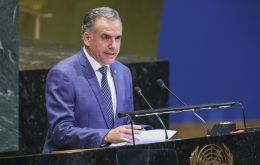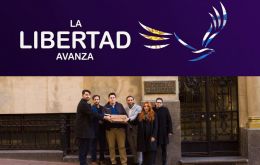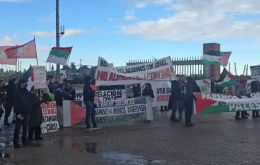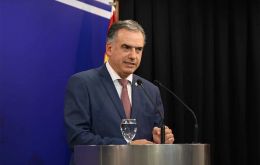MercoPress. South Atlantic News Agency
Uruguay
-
Thursday, October 2nd 2025 - 09:00 UTC
Uruguay's wool sector is going through a boom

Despite a long-term decline in flock size, Uruguay's wool and sheep sector is going through a boom driven by record-high international prices. Wool prices have reached their highest level in at least three years in the South American country, mirroring a dramatic surge in the Australian market.
-
Tuesday, September 30th 2025 - 08:29 UTC
Attack on Uruguayan prosecutor Mónica Ferrero: Police have yet to identify material perpetrators

Uruguayan police have not yet identified the material perpetrators of the attack on Supreme Prosecutor Mónica Ferrero, carried out early Sunday morning at her home, although they have clues about their possible identities, El País reported. The assault included gunfire against the residence and the detonation of a grenade; no injuries were reported.
-
Monday, September 29th 2025 - 10:46 UTC
Attack against Prosecutor's home shatters Uruguay

Uruguay's Judiciary was shattered on Sunday following an attack against the home of Acting Prosecutor General Mónica Ferrero, prompting an immediate, high-level political and police reaction.
-
Saturday, September 27th 2025 - 10:42 UTC
Uruguay insists on two-state solution for Palestinian crisis

Uruguayan President Yamandú Orsi and Foreign Minister Mario Lubetkin met on Friday in New York with Palestine's Ambassador to the United Nations Riad Mansur on the sidelines of the global body's 80th General Assembly.
-
Friday, September 26th 2025 - 10:32 UTC
Uruguay's La Libertad Avanza officially approved

Uruguay's Electoral Court officially recognized the local version of political party La Libertad Avanza (LLA) this week, as its resolution allowing it to compete in national, departmental, and municipal elections was published in the Official Gazette. The far-right movement is inspired by and closely linked to its Argentine counterpart of President Javier Milei.
-
Thursday, September 25th 2025 - 09:10 UTC
Orsi and Topolansky honor Mujica at event in New York

Uruguayan President Yamandú Orsi was the main speaker on Wednesday in New York during the so-called Mujica Initiative Forum, an event within the 80th United Nations General Assembly hosted by the Pan American Congress to honor the late José Pepe Mujica, a former head of State of the South American country and a key leftwing leader in the Americas.
-
Wednesday, September 24th 2025 - 20:49 UTC
Orsi highlights Uruguay's values at UN convention

Uruguayan President Yamandú Orsi described his country during his speech at the 80th session of the United Nations General Assembly as a suitable host for international negotiations and a promoter of dialogue.
-
Wednesday, September 24th 2025 - 10:30 UTC
Activist target livestock shipments from Montevideo to Israel

Protesters demonstrated this week at the port of Montevideo to object to the shipment of live cattle to Israel. The joint effort by the Coordination for Palestine and the Maritime Port Coordination argued that it was improper to feed the country perpetrating a genocide in the Gaza Strip.
-
Tuesday, September 23rd 2025 - 09:29 UTC
Orsi planning to highlight Uruguay's openness to multilateralism at UN

During his speech scheduled for Tuesday at the 80th United Nations General Assembly in New York, Uruguayan President Yamandú Orsi is expected to address his country's long-standing commitment to multilateralism and the peaceful resolution of global conflicts, amid the “worrying escalation” of the conflicts in Gaza and Ukraine, among other topics.
-
Monday, September 22nd 2025 - 10:55 UTC
Argentine outlet denounces Chilean and Uruguayan help to Royal Air Force

Argentine outlet criticized a Royal Air Force (RAF) transport Airbus A400M Atlas aircraft stopping in Chile and Uruguay on its way to the Falkland Islands, questioning the role of the two South American countries in the British strategy to maintain a permanent military presence in the South Atlantic, despite UN resolutions urging a resolution to the sovereignty dispute with Argentina.
